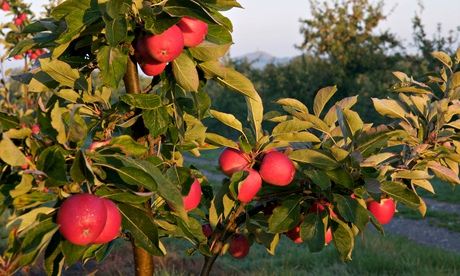
Last week marked the centenary of Laurie Lee's birth. That's reason enough for revisiting Cider With Rosie. Heck, waking up in the morning is motivation enough for re-opening this wonderful book. But the thing that most persuaded us at Guardian HQ to discuss Laurie Lee this month on the Reading group was actually a reader comment on our Tips, Links and Suggestions blog. I'll paste it in full here, so you can see why. Tinsley Collins wrote:
I originally read Cider with Rosie about a squillion years ago and I can remember endlessly reading passages from it to my first wife under the influence of a glass or two, or more often a bottle or two, too many. From the first line onwards it was obvious why it is such a classic that has gone into so many editions. What a joy of a book and what an absolute landmine of language. Every paragraph is a perfect gem; his descriptions of the locals, Cabbage Stump-Charlie, Tusker Tom, Albert the Devil and Harelip Harry had me weeping with laughter and his sketches of his siblings and of course his wonderful and chaotic mother had me in tears.
Try this, young Laurie being told by a local granny that it was her dad who planted a well known local tree: "My Dad planted that tree, she said absently, pointing out through the old cracked window. "The great beech filled at least half the sky and shook shadows over the house. Its roots clutched the slope like a great hand, holding the hill in place. Its trunk writhed with power, threw off veils of green dust, rose towering into the air, branched into a thousand shaded alleys, became a city for owls and squirrels. I had thought such trees to be as old as the earth, I never dreamed that man could make them. It was Granny Trill's dad who had planted this tree, had thrust in the seed with is finger. How old must he be to leave such a mark? Think of granny's age, and add his on top and you were back at the beginning of the world." It's been said of Elvis Presley that after him there was no point in any other pop singer. That's also true of this book. Until I read it I thought I could write. Now I know how far down the literary food chain I really am. Do not dare to die without having read it.
There's nothing I can really add to that, except to quote that magical opening sentence: "I was set down from the carrier's cart at the age of three; and there with a sense of bewilderment and terror my life in the village began."
We have to read this book.
As usual, I'd be delighted if anyone has suggestions for ways to approach the book, topics we might discuss and further reading. I'm also keen, time allowing, to press on into the war territory of Lee's later volumes of autobiography, so let me know if there's demand for that.
Finally, we've also got 10 copies of a rather lovely anniversary edition of the book from Vintage to give away - worth owning even if you already have a copy as it has a fine introduction from Michael Morpurgo, not to mention facsimiles of early draft pages of the book, and even a picture of the astonishing charabanc on which the villagers make their outing to Weston Super Mare … We're keen to put copies in the hands of the first 10 readers in the UK to post "I want a copy please", along with a nice constructive comment relevant to the book. And if you're lucky enough to get your request in quick enough, don't forget to email laura.kemp@theguardian.com as we can't track you down ourselves. Be nice to her too.
(As a side note, at the time of writing, not all copies of The Thousand Autumns of Jacob De Zoet have been claimed. If you were in the first 10 to post a comment last month, do write into Laura.)

